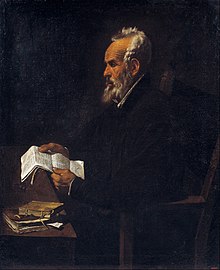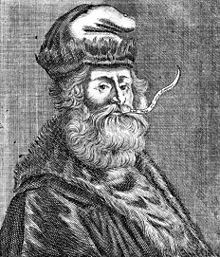Ramon Llull | |
|---|---|
 Anachronistic portrait of Ramon Llull by Francisco Ribalta (1620) | |
| Born | c. 1232 City of Mallorca, Kingdom of Majorca (now Palma, Spain) |
| Died | possibly 25 March 1315 or 1316 (aged 83–84) |
| Venerated in | Roman Catholic Church |
| Beatified | 11 September 1847 by Pope Pius IX |
| Feast | 30 June (Third Order of St. Francis) |
Philosophy career | |
 Anachronistic image of Ramon Llull with speech scroll, by an unknown artist (16th–17th century) | |
| Notable work | |
| Era | Medieval philosophy |
| Region | Western philosophy |
| School | Lullism |
Main interests | |
Notable ideas | |
|
Preview warning: Page using Template:Infobox philosopher with unknown parameter "influences" Preview warning: Page using Template:Infobox philosopher with unknown parameter "influenced" | |
Ramon Llull TOSF (Catalan: [rəˈmoɲ ˈʎuʎ]; c. 1232[a] – possibly 25 March[4] 1315/1316), [b] was a philosopher, theologian, poet, missionary, Christian apologist and former knight from the Kingdom of Majorca.
He invented a philosophical system known as the Art, conceived as a type of universal logic to prove the truth of Christian doctrine to interlocutors of all faiths and nationalities. The Art consists of a set of general principles and combinatorial operations. It is illustrated with diagrams.
A prolific writer, he is also known for his literary works written in Catalan, which he composed to make his Art accessible to a wider audience. In addition to Catalan and Latin, he also probably wrote in Arabic (although no texts in Arabic survive). His books were translated into Occitan, French, and Castilian during his lifetime.[5]
Although his work did not enjoy huge success during his lifetime, he has had a rich and continuing reception. In the early modern period his name became associated with alchemical works.[6] More recently he has been recognized as a precursor of the modern field of social choice theory, 450 years before Borda and Condorcet's investigations reopened the field.[7][8] His ideas also prefigured the development of computation theory.[2][9][10]
- ^ Frances Yates, "Lull and Bruno" (1982), in Collected Essays: Lull & Bruno, vol. I, London: Routledge & Kegan Paul.
- ^ a b The History of Philosophy, Vol. IV: Modern Philosophy: From Descartes to Leibniz by Frederick C. Copleston (1958).
- ^ Anthony Bonner (ed.), Doctor illuminatus: A Ramon Llull Reader, Princeton University Press, 1993, p. 82.
- ^ "Concession of Mass". newsaints.faithweb.com. Retrieved 2024-08-18.
- ^ Badia, Lola; Santanach, Joan; Soler, Albert (2016). Ramon Llull as a Vernacular Writer: Communicating a New Kind of Knowledge. Woodbridge: Tamesis.
- ^ Pereira, Michela (1989). The Alchemical Corpus attributed to Raymond Lull. London: The Warburg Institute.
- ^ George G. Szpiro, "Numbers Rule: The Vexing Mathematics of Democracy, from Plato to the Present" (2010).
- ^ Colomer, Josep M. (2013-02-01). "Ramon Llull: from 'Ars electionis' to social choice theory". Social Choice and Welfare. 40 (2): 317–328. doi:10.1007/s00355-011-0598-2. ISSN 1432-217X.
- ^ Bonner 2007, p. 290.
- ^ Donald Knuth (2006), The Art of Computer Programming: Generating all trees, vol. 4–4, Addison-Wesley Professional, p. 56, ISBN 978-0-321-33570-8
Cite error: There are <ref group=lower-alpha> tags or {{efn}} templates on this page, but the references will not show without a {{reflist|group=lower-alpha}} template or {{notelist}} template (see the help page).